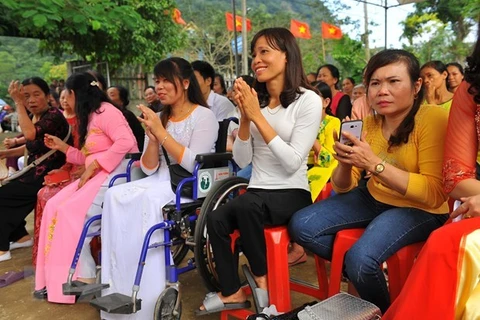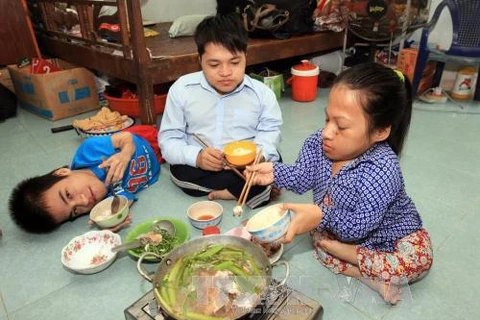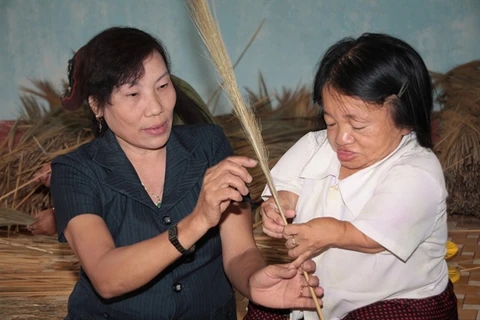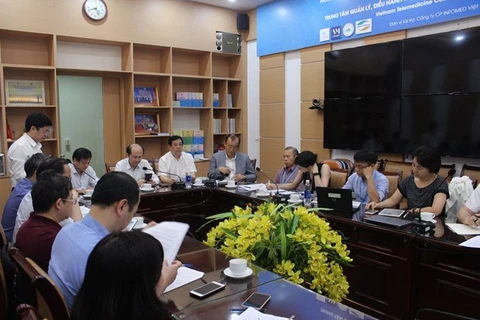 The Ministry of Heath’s Department of Medical Services Administration (MSA) on June 2 signs a Memorandum of Understanding (MoU) with eight local and international Non-governmental Organisations (NGOs) in enhancing rehabilitative services for people with disabilities in Vietnam. (Photo: VietnamPlus)
The Ministry of Heath’s Department of Medical Services Administration (MSA) on June 2 signs a Memorandum of Understanding (MoU) with eight local and international Non-governmental Organisations (NGOs) in enhancing rehabilitative services for people with disabilities in Vietnam. (Photo: VietnamPlus)
Hanoi (VNA) – The Ministry of Heath’s Department of Medical Services Administration (MSA) will partner with eight local and international Non-governmental Organisations (NGOs) in rehabilitation to improve life quality of people with disabilities in Vietnam, as part of a Memorandum of Understanding (MoU) signed in Hanoi on June 2.
The eight NGOs include: the Action to the Community Development Center (ACDC); the Vietnam Assistance for the Handicapped (VNAH); the Medical Committee Netherlands-Vietnam (MCNV); the International Centre (IC); the Humanity & Inclusion (IH); the Center for Creative Initiatives in Health and Population (CCIHP); the Sustainable Health Development Center-VietHealth; and the Institute of Population, Health and Development (PHAD).
Speaking at the event, MSA Director Luong Ngoc Khue highlighted the importance of rehabilitative services in improving people’s well-being. The rehabilitative services have played a vital part in helping COVID-19 patients recover, particularly those in critical conditions, such as Patients No.91, 19 and 161, said Khue
“Each NGO has its own strengths in rehabilitation and helping people with disabilities participate in society. The co-operation with NGOs will help to minimise overlaps between organisations, while enhancing the effectiveness of care and support activities for people with disabilities,” he noted.
He added that the collaboration with NGOs will promote the development of rehabilitative services as well as activities to support people with disabilities in Vietnam.
Under the framework of the USAID-funded agreement, collaboration activities will focus mainly on the development of healthcare models and rehabilitation facilities for people with disabilities in the country, and improve the laws and policies on rehabilitation as well as the capacity of rehabilitation centres in some project areas. The agreement also aims to strengthen human resources training in rehabilitation and improve medical services for people with disabilities in the country.
The MSA also inked an agreement with the VNAH to implement the USAID-funded project “Disability Rights Enforcement, Coordination and Therapies”.
The project provides technical support to the Vietnamese government’s partners to develop and execute the action plan for the Convention on the Rights of Persons with Disabilities (CRPD), as well as revise sectoral policies to be compatible with the CRPD. The project also aims to improve the enforcement of existing disability laws, the National Disability Action Plan, and the action plan for the rehabilitation sector, including the expansion of health insurance coverage for rehabilitation services.
Specifically, the project aims at enhancing resources for disability programmes and services and access to quality rehabilitation services, with priority given to Agent Orange/Dioxin victims and people with critical disabilities.
Later the same day, the eight NGOs participated in a workshop to review and discuss amendments to the Law on Medical Examination and Treatment that are expected to create a better legal framework for healthcare and rehabilitative services. The 91-article law was adopted by the National Assembly in November 2019 and started to take effect in 2011.
Vietnam has developed a rehabilitative service network, with two hospitals and rehabilitation centres, 38 provincial rehabilitation and traditional medicine hospitals, and 550 rehabilitation departments of general hospitals, and central, provincial and district hospitals.
More than 9,000 out of the 11,000 communes with medical staff have been trained in rehabilitation and about 25 percent of communes can provide rehabilitation services in the commune and community-based rehabilitation.
By the end of 2019, there were more than 11 million elderly people and around 6.2 million people with disabilities over the age of two in Vietnam, or 7.9 percent of the total population, according to the MSA. Additionally, about 13 percent of the population, or nearly 12 million people, live with family members with disabilities./.























